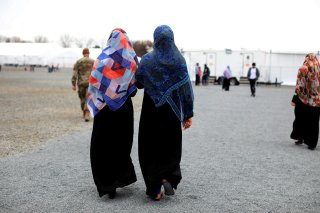Exile in America Brings Feelings Of Grief and Opportunity For Afghan Women
Now in exile, some Afghan women struggle to accept that the progress they contributed to came crashing down so quickly. They start their days by reading stories about new atrocities, new waves of women fleeing the country, and new signs of despair. Yet, some live with the hollow hope that they will one day return to a liberated motherland.
This is the second time that Fahima and her family have fled the Taliban. The first time was in the 1990s when the family sought safety in Iran. Fahima and her family returned to Herat from exile in Iran after the Taliban regime collapsed in 2002. “Herat is a place I know and I love,” she said. “I went to school and college there. I made friends, had a job and an established life.”
When Fahima heard the sound of gunfire around her house in Herat for days and nights, she decided to leave the city and move to Kabul. “I knew I would not stay in Kabul either, and I should have found a way to leave the country,” she said. As a Hazara, what Fahima heard about the Taliban’s treatment of Hazaras in the 1990s intensified her will to leave.
Fahima was in Kabul when the Taliban took it over in August 2021. “The two days that I lived in the same city with the Taliban’s members were the scariest days of my life,” Fahima recalled. She witnessed an unfamiliar and severe panic among the people as the Taliban tightened their grip on the city. Two days after the Taliban’s takeover, Fahima packed some personal belongings, bid farewell to her family, and headed toward the airport. “I knew I wanted to leave, and I knew I would not return, at least not any time soon.”
In Virginia, Fahima lives with her sister and her cousin in a three-bedroom apartment. She works for a Turkish catering company full-time, where she has learned to cook Turkish meals. She also has the chance to practice English with her co-workers. On weekends, Fahima attends an English class, where she met a group of immigrants from different backgrounds. “I have the chance to learn the language, reading, writing, and speaking, for which I am grateful,” she said. Fahima is determined to pursue an education in Virginia, for which she is improving her English. When she is not working and doing homework, Fahima hangs out with other Afghans living in Virginia. “I have a job, family members, friends, and all the freedom one can wish for. I am happy here.”
The adjustment is big, but parts of life are also slowly returning to normal. “Last week, I traveled to West Virginia with my sister, where I joined a group of Afghans for camping and enjoying the beautiful scenery.”
The new Taliban government in Afghanistan has made clear that it intends to severely restrict the freedoms previously enjoyed by many women and girls. They made it clear that Afghanistan is no longer a home for female educators, judges, journalists, artists, business owners, and politicians. The professional women who stayed live in secrecy and fear. As the Taliban begin to rule strictly by decree and intimidation, Afghan women had made their way out of the country to live in comparative freedom. Since August 15, 2021, thousands of Afghan women have left the country to live in the United States.
For some women, living in America is to escape almost certain death. They are shocked and struggle to process events back home, while for others living in the developed world allows them to enjoy life in relative freedom and opportunity. What continues to be shared among them is that leaving everything they strived to achieve is difficult.
But these senses of loss are not uniform. For some, coming to the United States represents an immense loss and requires starting over from scratch, whereas for others—especially those who were less fortunate in Afghanistan—it is a rebirth and a once-in-a-lifetime opportunity.
Nazila Jamshidi is a gender equality and human rights specialist involved in Afghanistan’s development and democracy processes for the past decade. She has worked for the UN, USAID, the IFRC, and various other international organizations. A native of Afghanistan, Jamshidi is now an M.A. candidate at Columbia University.
Image: Reuters

